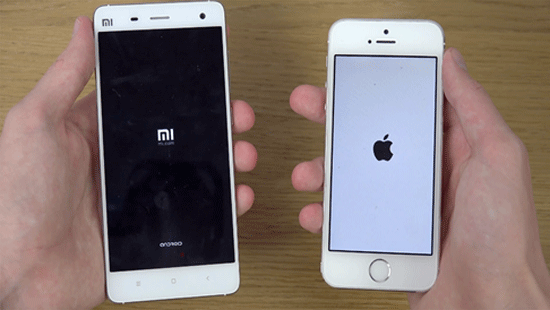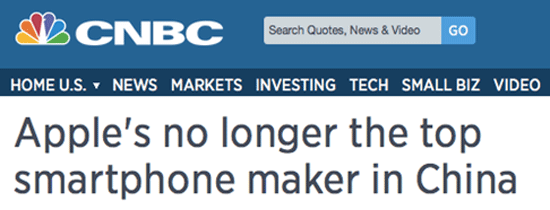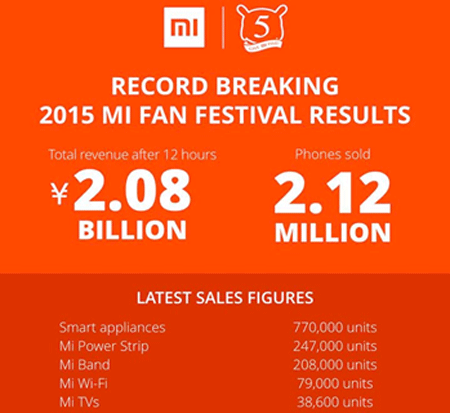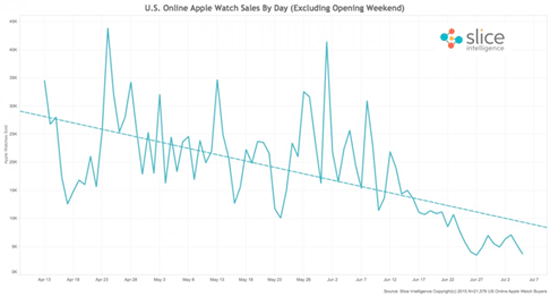If you own Apple stock, you better pay attention.
A Chinese company named Xiaomi is eating Apple’s lunch in China, and its popularity is slowly spreading across the globe.
Don’t feel bad if you have never heard of it, because very few Americans have. However, Xiaomi is a household name in Asia and may soon become one in the US too.

Xiaomi—pronounced SHOW-em—is a smartphone maker, and it happens to make the #1 bestselling smartphone in China. Yup, Xiaomi is even more popular than the Apple iPhone.
The most recent market share numbers show that Xiaomi grabbed 15.9% of the mobile phone market in China during the second quarter of this year. In 2014, Xiaomi sold 420 million smartphones and pulled in $12 billion in revenues.

The Xiaomi phone that is generating those big sales is the Mi Note. Its screen is considerably larger than the iPhone’s. It is thinner, weighs nearly half an ounce less, has longer battery life and a higher-resolution camera that takes beautiful photos, and is compatible with all the Android apps on Google Play.
Best of all, it costs only $370 without a contract!
“Mi” Fans
Chinese consumers are crazy about Xiaomi. Really crazy!
They call themselves “Mi-fans.” They have fan clubs and a “Mi-Fan Day” on April 6, when tens of thousands of Chinese travel all across China to attend new product launches. The crowds are so large—as many as 170,000—that security is required for crowd control.
At the recent 2015 Xiaomi festival, the company sold over 2 million smartphones and pulled in 2.08 billion yuan (US$335 million) in just 12 hours.

Part of the euphoria comes from charismatic founder Lei Jun, who inspires loyalty in his customers in much the same way the late Steve Jobs did for Apple. Lei even wears jeans and a black turtleneck like Jobs.
Charisma can create excitement, but a company needs to deliver a great product too. Xiaomi is known for delivering high-quality products at very affordable prices and has built a dedicated consumer base that absolutely loves its products.
Heck, Apple isn’t even #2 in China; a Taiwanese company called Huawei was a close second with a 15.7% market share. Xiaomi and Huawei together now control one-third of the smartphone sales in China.
The iPhone has fallen to third place with 10.9% of the market, closely followed by Samsung.
Third place is bad enough, but China, which was supposed to power Apple’s growth going forward, is now a drag for Apple: China sales plunged by 21% in the second quarter from Q1.
By comparison, Huawei’s sales surged 48% over the prior quarter.

What’s an investor to do?
I’m not suggesting that you buy Xiaomi stock.
Why not?
Because you can’t!
Xiaomi is one of the world’s largest smartphone makers, but it is privately held and estimated to be worth $46 billion, which makes it the second-highest valued private tech company in the world (behind Uber).
On April 28, 2015, I wrote this about Apple: “My expectation is that we’ll have a chance to buy it at a much cheaper price later this year.”
Apple closed at $130.02 that day, just a couple bucks off its 52-week high of $134.54, but is now substantially cheaper, as I predicted.
What I’m suggesting is that Apple’s best days are behind it, and I don’t say that just because Xiaomi and Huawei are kicking its ass in China:
- Apple missed expectations on shipments for all its major products. In particular, investors were expecting a monster iPhone quarter, but Apple sold only 47.5 million iPhones instead of nearly 49 million as predicted.
- Microsoft’s Windows 10 will provide more competition to the iPad and Mac.

- Apple hasn’t revealed specific sales figures for the Apple Watch, but analytics firm Slice Intelligence says that sales have dropped from an average of 35,000 a day in April to 5,000 a day in July.
- The smartphone market is maturing. Global mobile phone shipments grew a paltry 2%, from 428 million units in Q2 2014 to 434.6 million units in Q2 2015.
Look, the iPhone accounts for 70% of Apple’s total revenues, and the Chinese weakness is trouble because China passed the US as Apple’s biggest iPhone market in the first quarter of this year. Today, China is the world’s largest smartphone market, and Apple isn’t doing well there.
Heck, even CEO Tim Cook has acknowledged that China is creating “speed bumps” for Apple.
I’m not telling you to sell your Apple stock tomorrow morning. But I am telling you that you need some type of exit strategy to protect yourself because Apple’s stock is headed lower.
Let the hate mail begin!
Forget Apple… To find some great value stocks with good upside and an average yield of 4.75% (in our current portfolio), take advantage of our 90-day money-back guarantee and give Yield Shark a risk-free try.

Tony Sagami
30-year market expert Tony Sagami leads the Yield Shark and Rational Bear advisories at Mauldin Economics. To learn more about Yield Shark and how it helps you maximize dividend income, click here. To learn more about Rational Bear and how you can use it to benefit from falling stocks and sectors, click here.

